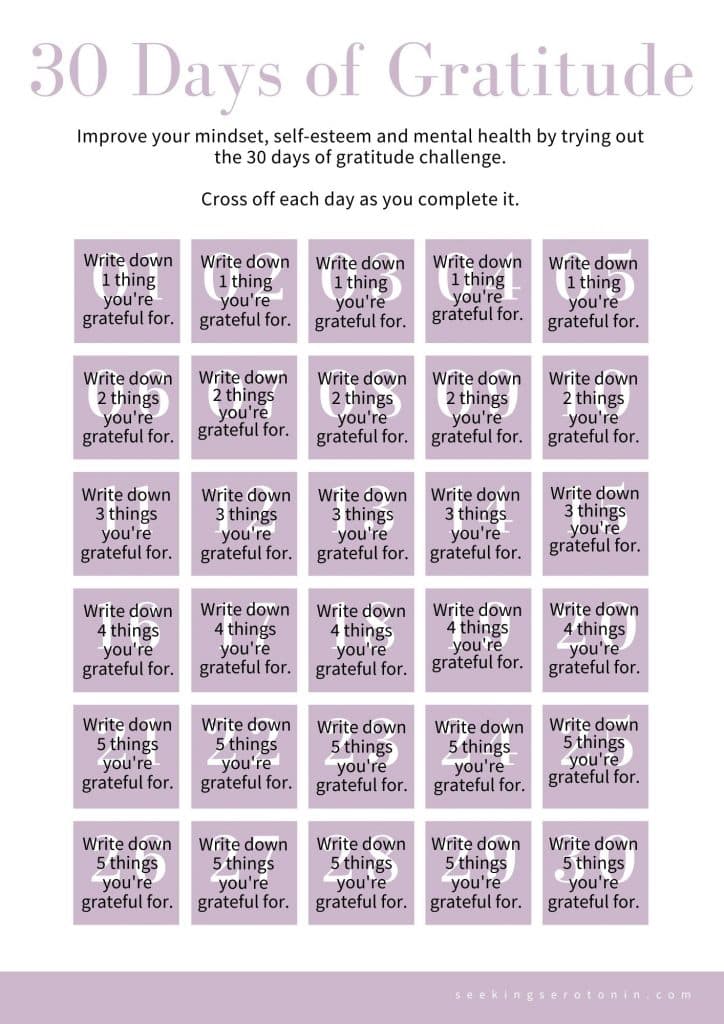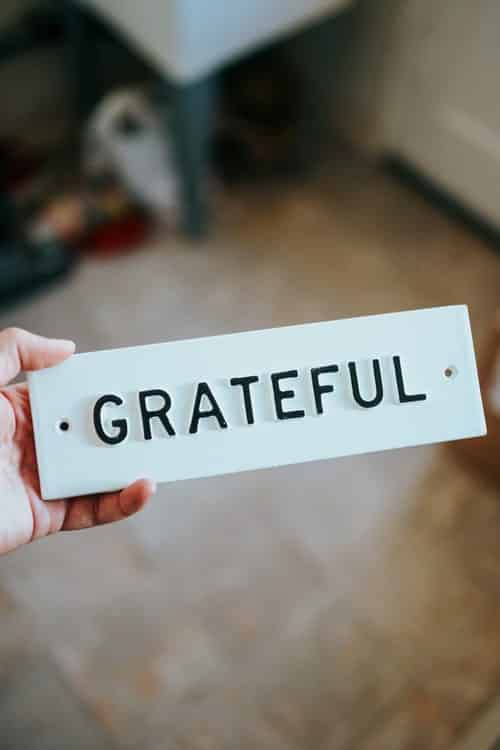30 Days of Gratitude Challenge: Transform Your Mindset
Practising gratitude has been shown to bring happiness, improve our relationships and even boost our immune system after a short time, but why should we practise 30 days of gratitude?
Practising gratitude for 30 days is, in theory, long enough for us to experience the numerous benefits of being thankful (such as improved mindset and mental health), while also giving us a chance to form a habit. Studies show that turning gratitude into a positive daily habit is key for long-term happiness, our relationships, and our outlook on life in general.
I’ve been actively practising gratitude every single day for over a year now and that – along with my other journal practises like goal-setting, affirmations, and using prompts – has been nothing short of life-changing.
Before that, I would practise focusing on the positive things I was thankful for over the negative from time-to-time, but never managed to turn it into a real habit.
I think a lot of us struggle with maintaining these habits, even though we KNOW they’re going to improve our mindset, because our self-worth is just as low as our motivation.
Turning it into a habit was the real game-changer for me and in order to do that I had to stick to practising gratitude for 30 days.
What is the 30 days of gratitude challenge?
The 30 days of gratitude challenge is, quite simply, a period of 30 days where you challenge yourself to practise gratitude every single day.
Why 30 days?
The idea behind this time period is that you’ll experience the benefits of practising every day, while not overwhelming yourself.
30 days is a manageable amount of time to stick to the challenge without having to think beyond that, which can often be daunting and even discouraging.
If I told you to practise gratitude every day for the next year, you’re probably going to struggle to motivate yourself to do so because it feels like you’ve got a mountain to climb. Whereas 30 days feels much more doable.
It’s also widely believed that is takes three weeks – or 21 days – to form a habit. 30 days gives you plenty of time to form this positive habit so that you can continue practising gratitude long-term if you feel it works for you.
30 Days of Gratitude Prompts
If you struggle to come up with stuff to be thankful for on the fly, I’ve put together 30 days worth of prompts and activities to get you started.
You can pick one a day during the challenge.
- What’s made you smile today?
- What are you looking forward to today?
- What’s your favourite breakfast food?
- What drink makes you feel comforted and content?
- What’s a movie that makes you feel good every time you watch it?
- Listen to a song that brings you joy.
- Who’s one person you can always count on?
- What’s one thing that’s made you belly-laugh recently?
- Look out your window and pick one piece of nature to feel grateful for.
- Feel the ground on your bare feet.
- Take a deep breath, hold it at the top, and then let it go with a sign. Feel gratitude for the air you breathe.
- Take a satisfying shower and appreciate it.
- Eat a nourishing, tasty meal. Feel gratitude for it.
- Make your bed your safe haven.
- What’s the weather like today? Pick at least one thing you like about it.
- What are three traits you like about yourself that you’re thankful for?
- What the best thing that happened this week?
- What’s something kind that you’ve done for someone recently?
- What’s something kind that someone else has done for you recently?
- What’s your favourite thing to do with your friends?
- What’s your favourite smell that you get to enjoy all the time?
- What’s your favourite form of entertainment that you can do today?
- What are you really good at? What talent or skill are you most grateful for?
- Think or write about a memory that you’re really grateful for.
- Set some goals for the future; feel gratitude that you get to achieve these one day.
- What creature comfort are you grateful for?
- What piece of technology are you grateful for?
- What are you looking forward to in the future?
- What does gratitude mean to you?
- How has practising gratitude for 30 days made you feel?
Feel free to use the prompts in your journal, or simply let them get you thinking.
Why does 30 days of gratitude work?
Practising gratitude for 30 days works well for a few reasons:
- It teaches you how to practise gratitude
- It encourages you to take time out of your day to do something positive
- It’s long enough to feel the true benefits
- Prevents you from feeling overwhelmed with long-term goals
- Gets you in the daily habit of being thankful
All these reasons combined make the 30 day challenge is really effective way to start improving your mindset.

So, when should you start the 30 days of gratitude challenge?
You can start practising gratitude at any time.
It doesn’t need to be on the first of the month – as the saying goes, “the best time was yesterday, the second best is now.”
Thinking about what you’re thankful for only takes a minute or so and can be done any time, anywhere.
Feel free to use the graphic on the right to track your days.
What are the benefits of practising gratitude?
Practising gratitude is a key component of the journaling technique I teach in my Master Your Mindset With Journaling workbook.
And this is with good reason.
Gratitude journaling has significantly shifted my mindset from quite a dark, negative place to a lot more positive, optimistic one.
It works by basically reprogramming our thought processes by encouraging our brains to focus on the positive over the negative. With time – and practise – is becomes second nature.
It makes sense right?
When we focus and spend our energy on what we DO have rather than on what we don’t it’s only natural that we feel more upbeat.
Instead of focusing on the negative, over-thinking, and self-sabotaging, my mind now chooses to focus on the silver lining.
You might think that this makes me overly positive, causing me to ignore anything remotely negative. (The problem this is that it falls into the category of toxic positivity; you ignore anything that isn’t good, try to put a positive spin on even the worst situation, undermine other people’s feelings, shrug off responsibility, and end up denying yourself from experiencing the full spectrum of real human emotions.
Bad stuff happens, that’s part of life, it’s how we deal with it that’s important.)
However, this isn’t the case at all.
Instead of burying my head in the sand, procrastinating and completely ignoring all my problems in the hope it would make me a more positive person, I now feel confident and capable of tackling any hurdles head-on.
Other benefits of practising gratitude are:
- Improved mental health
- Improved relationships
- Improved self-esteem
- Relieves stress
- Increases empathy
- Helps clear our minds
- Stops over-thinking
- Makes us better at our jobs
- Reduces blood pressure
- Improves sleep
- Boosts motivation
- Helps people in recovery from a whole host of issues
How to get the most our of the 30 days of gratitude challenge
You’ve decided that you want to do the 30 day challenge and jump into the wonderful world of feeling more positive.
But how do you get the most out of the challenge, other than just starting and checking off the days until it’s over?
Here are some of my best tips to get the most out of your 30 consecutive days of gratitude.
Find your ‘why’: Finding you reason – your ‘why – is important when it comes to any goal. In this case, your goal is to complete the 30 days of gratitude and get the most positive outcome out of the experience as possible.
So, why do you want to complete this challenge? Why do you want to practise gratitude?
Some reasons might be:
- You want to improve your mindset
- You want to be a more positive person
- You want to improve your relationships
- You want to improve your mental health
- You want to improve your self-esteem
Try to really harness how you would feel once you’ve completed the challenge. What would it bring to your life? What lessons do you want to learn?

Note your ‘why’ down in your journal, in your phone, or even on a random piece of paper so that you can refer back to it when you need motivation. Then, at the end, you can see how far you’ve come.
Make a plan of action: I always find it easier to achieve my goals when I have a clear plan of action laid out in front of me.
How do you plan to practise gratitude?
Affirmations? Gratitude lists?
Will you be writing down what you’re grateful for or simply thinking about it?
The choice is completely yours.
It’s helpful to be sure of these things before you start the 30 day challenge so that you’re not overwhelmed.
Set goals: What would you like to achieve from your the gratitude challenge?
Perhaps you’d like to discover a deeper appreciation for your current life; maybe you’re interested in the Law of Attraction and want to raise your vibration; or you might just want to improve your mindset.
I invite you to note down what goals you have to not only inspire you but keep you motivated.
Journal your experience: It can be helpful to journal about your experience as you go through the 30 days.
Journaling can make you more introspective, mindful, and self-aware, which can help you grow even further.
After you’ve practised gratitude, maybe ask yourself some questions:
- How did that make me feel?
- How am I finding this method of practising gratitude?
- Is there any change from yesterday?
- How do I feel about practising gratitude again tomorrow?
Asking yourself just a few key questions allows you to tap into how you’re really feeling about the process.
Practise self-care: Self-care is essential for our emotional, mental, and physical health and while I do consider practising gratitude a self-care activity in itself, it’s also incredibly important to practise other types of self-care every single day.
In order to get the most out of the gratitude challenge, I invite you to pay particularly close attention to your self-care routine and make sure you’re treating yourself EXACTLY how you deserve to be treated.
You’re worthy and amazing of care, and while you should be practising it outside of the challenge, it’s especially important to practise self-care during the challenge if you want to get the most out of it.
By sticking to a self-care routine as well as practising gratitude for 30 days, you’ll feel like a million bucks by the end.
How do you practise gratitude?
I know, I know. ‘How many ways are there to be grateful?’ I hear you ask.
Actually, a few.
Some examples are:
- Journaling
- Affirmations
- Writing gratitude lists
- Setting reminders to be grateful
- Redirecting negative self-talk to things you’re thankful for
In essence, they all come down to the same practise: being thankful for what we’ve got. However, deciding on how you want to practise your gratitude in advance can help make your practise more structured. (If that works for you, of course.)
It also gives you more than one option if one gratitude technique isn’t working for you as well as you would have hoped.
Gratitude journaling: My favourite way to practise gratitude is in my journal.
While you don’t have to have a whole journal dedicated to gratitude, making sure to include it in your routine can be really beneficial and a time-saver.
I find gratitude journaling so effective that I teach and walk you through exactly how to do it in my Master Your Mindset With Journaling workbook, along with four other steps I use in my everyday journal practise to transform my mindset.
Using journaling prompts for gratitude is also a great way to sneak gratitude into your journal practise.

Affirmations for gratitude: Affirmations can be either written in a journal, on paper, or simply said in your head. (If you’re feeling extra spicy, you can even say them out loud, but I’m too introverted for all that.)
They’re usually self-affirming statements that we repeat over and over in order to ‘trick’ our brains into actually believing them.
With time, repeating affirmations has been found to improve self-esteem and relieve stress.
In the context of gratitude, some affirmations you might want to repeat are:
- I’m so grateful to get to wake up and experience a new day
- I’m thankful for the people I have in my life
- I invite gratitude, happiness, and abundance into my life
I have a post on gratitude affirmations, if you want to find more.
Gratitude lists: Not really into journaling or affirmations? Well there’s no harm in simply writing a list of things you’re grateful for each day.
Choose a notebook, Word doc., or random scrap of paper and just get writing.
As long as you feel the gratitude coursing through your veins, you’re golden.
Reminders: Setting reminders on your phone or even putting little sticky notes around your home can be a good way to practise gratitude, especially if you find it difficult to remember.
I invite you to try writing down things you’re thankful for on sticky notes and putting them around your house in places you know you’ll see them every day, or set a reminder/alarm on your phone of something you’re really grateful for so when the alarm goes off, it pops up on your screen and you have to see it.
Starting your day off on a positive note is unreal for your mindset.
Redirect negative self-talk: Gratitude can come in really handy when you’re engaging in negative self-talk.
Replacing your negative, self-deprecating thought with a positive, hopeful, thankful one basically flips the script and is so helpful for improving your mood.
My main tip when practising gratitude is to really FEEL the feeling of being grateful while you practise. Let that warm fuzziness envelope you.
I know this might sound obvious, but it’s that FEELING and the emotions that come with it that we want to harness. We shouldn’t just be writing stuff down on a piece of paper on autopilot – that’s just a waste of time (and paper.)
What are some reasons to be grateful?
If you’re sitting there and thinking that this is all well and good, but what do I even have to be grateful for? Please don’t worry.

Being down is just a part of life; we have to experience the negative to appreciate the positive.
What’s more, if you’re dealing with depression or other mental health issues that result in a feeling of hopelessness, it’s okay. I’ve dealt with depression for almost 20 years, so please know that I see you and understand you. I know how hard it is to feel grateful when you can’t even get yourself out of bed. (If you haven’t already, please seek professional help.)
If you’re struggling with finding reasons to be grateful, here are a few of mine that I tend to note down in my journal.
- The sunrise
- Hot coffee
- Strong tea
- My warm bed
- Candles – because they’re a vibe
- Internet access – because I’m such a damn millennial
- My sobriety that I fought for years to achieve
- Self-awareness
These are just some of mine, but you might want to write your own.
I have a list of 100 things to be grateful if you need more ideas.
How to get into the habit of practising gratitude
Arguably the trickiest part of the 30 days of gratitude challenge is sticking to it.
We have busy lives and forming habits can be hard, even if we KNOW they are in our best interest.
I am exactly the same.
However, I feel like I’ve cracked it. After years of trying on-and-off, I’ve now been practising gratitude every single day for over a year straight and the benefits have been amazing.
Here’s how.
- Set an alarm/reminder: If you struggle to remember to practise gratitude, try setting an alarm or reminder on your phone to go off at the same time. Make sure to make a note on your alarm or reminder that this is your time to practise gratitude so that you don’t wonder why your phone is going off!
- Make a note: If you’re not really into the idea of making notes on your phone, perhaps try leaving yourself physical notes! Sticky notes around your mirror, notes on your fridge, a reminder written in your work planner all work well – as long as you’re going to see them.
- Keep your journal by your bed: If you’re practising gratitude in a journal, make sure to leave your journal exactly where you’ll be forced to see it. This might be the kitchen table for a lot of people, beside your bed, or even on your work desk. Anywhere you’ll be sure to see it.
- Remember your ‘why’: If you struggle to not only remember to practise gratitude but to motivate yourself to do it, make sure to keep your ‘why’ in the forefront of your mind. Thinking about your ‘why’ should help you remember how to achieve said ‘why’, which is by practising gratitude.
If you love the 30 days of gratitude challenge, I have a free 30-day journaling challenge aimed at helping you improve your mindset through journaling.

A witchy ray of sunshine who loves to help others on their journal journey. I’ve been journaling since childhood and have since gone on to earn a degree in English and a diploma in Shadow Work. I love my plant babies, yoga, and anything spooky. Find out more on my about me page.
2 Comments
Comments are closed.